- Home
- Clive Barker
Abarat
Abarat Read online
Abarat: Absolute Midnight
Clive Barker
Dedication
Johnny 2.0 Raymond
Mark Miller
Robbie Humphreys
Epigraph
There’ll be no sun tomorrow morning.
There’ll be no moon to bless the night.
The stars will perish without warning.
These lines proclaim the death of light.
Contents
Cover
Title Page
Dedication
Epigraph
Prologue: What the Blind Man Saw
Part One: The Dark Hours
Chapter 1. Toward Twilight
Chapter 2. The Council Speaks its Minds
Chapter 3. The Wisdom of the Mob
Chapter 4. The Kid
Chapter 5. Remnants of Wickedness
Chapter 6. Under Jibarish
Chapter 7. The Sorrows of the Bad Son
Chapter 8. Laguna Munn
Part Two: You, or Not I
Chapter 9. A New Tyranny
Chapter 10. The Sorrows of the Good Son
Chapter 11. Severance
Chapter 12. One Becomes Two
Chapter 13. Boa
Chapter 14. Empty
Chapter 15. Face-to-Face
Chapter 16. Laguna Munn Angered
Chapter 17. Snake Talk
Chapter 18. An EndGame
Chapter 19. The Price of Freedom
Part Three: Many Magics
Chapter 20. Tomorrow, Today
Chapter 21. Boa at Midnight
Chapter 22. Turning Away
Chapter 23. Cold Life
Chapter 24. At the Preacher’s House
Chapter 25. No More Lies
Part Four: The Dawning of the Dark
Chapter 26. The Church of the Children of Eden
Chapter 27. Interrogation
Chapter 28. Altarpiece
Chapter 29. Midnight has Wings
Chapter 30. Draining the Ghost
Chapter 31. The Flock
Chapter 32. Sacrilege
Chapter 33. No Stranger Now
Chapter 34. Unfinished
Chapter 35. Stealing Away
Chapter 36. The Shadow-Shroud
Chapter 37. Love and War
Chapter 38. An Old Trick
Chapter 39. Looking Forward, Looking Back
Chapter 40. Bones and Laughter
Chapter 41. Dragon Dust
Chapter 42. The Fiends
Chapter 43. Dark Waters
Chapter 44. Pariah
Part Five: Stormwalker
Chapter 45. The Business of Empire
Chapter 46. Talking of Mysteries
Chapter 47. Convergence
Chapter 48. Smiles
Chapter 49. Of Those Who Walk Behind the Stars
Chapter 50. Out of the Deep
Chapter 51. Father and Son
Chapter 52. Atrocities
Part Six: There is No Tomorrow
Chapter 53. Forgiveness
Chapter 54. The Empress in her Glory
Chapter 55. Below
Chapter 56. The Hand in Fire
Chapter 57. A Knife for Every Heart
Chapter 58. Now, Because
Chapter 59. A Whisper of Infinitude
Chapter 60. Abarataraba
Part Seven: Oblivion’s Call
Chapter 61. Missing
Chapter 62. The Volcano and the Void
Chapter 63. Pigs
Chapter 64. No Plan B
Chapter 65. Lullaby
Chapter 66. Love, Too Late
Chapter 67. Yat Yut Yah
Chapter 68. Deliverance
Chapter 69. For Every Knife, Five Hearts
Chapter 70. Nothing But Stones
Chapter 71. An Execution
Chapter 72. Truth
Chapter 73. Souls
Chapter 74. The Hammer of the Nephauree
Chapter 75. The End of the World
Chapter 76. And Beyond
Copyright
About the Publisher
Prologue
What the Blind Man Saw
Dream!
Forge yourself and rise
Out of your mind and into others.
Men, be women.
Fish, be flies.
Girls, take beards.
Sons, be your mothers.
The future of the world now lies
In coral wombs behind our eyes.
—A song sung in Paradise Street
ON THE EARLY COAST of Idjit, where two a.m. looked south over the darkened straits toward the island of Gorgossium, there was a house, its facade much decorated, set high upon the cliffs. Its occupant went by the name of Mr. Kithit, and several others besides, but none of the names were truly his. He was known simply as the Card-Reader. The cards he read were not designed for games of chance. Far from it. He only ever used the Abaratian tarot deck, wherein a reader as expert as Mr. Kithit might find the past murmuring, the present in doubt, and the future barely opening its eyes. A decent living could be made from interpreting the way the cards fell.
For many years the Card-Reader had served the countless customers who came there in search of wisdom. But tonight he was done with serving the curiosity of others. He was done with it forever. Tonight, it was not the future of others he was going to find in the cards. They had summoned him to show him his own destiny.
He sat down and took one slow, calming breath. Then he proceeded to lay out a pattern of nineteen cards chosen by the will of his fingertips. Blind though he was, each image appeared in his mind’s eye, along with its name and numerical place in the pack.
There was Fear. There was The Door to the Stars. There was The King of Fates and The Daughter of Curiosity. Each card was not only to be read for its own values, but also calibrated against the cards surrounding it: a piece of mythological mathematics, which most heads could not fathom.
The Man Lit by Candles; Death’s Island; The Primal Form; The Tree of Knowing . . .
And of course the entire arrangement had to be set against the card that his customer—in this case himself—had chosen as his Avatar. In this case, he had elected a card called The Threshold. He had put it back into the pack and then shuffled the cards twice before laying them out by instinct in the Naught Hereafter Spread, its name signifying that all things the Deck contained would be here displayed: all reparations (the past), all possibilities (now), and all risk (henceforth and ever).
His fingers moved quickly, summoned by a call from the cards. There was something here they wanted to show him. He quickly understood that there was news of great consequence here, so he neglected the rules of reading, one of the first being that a Reader waited until each of the number of cards required for the Spread had been laid out.
A war was coming; he saw it in the cards. The last of the plots were being laid, even now, the weapons loaded and polished, the armies assembled, all in readiness for the day when Abaratian history turned the final corner. Was this the cards’ way of telling him what part there was for him to play in this last, grim game? If so then he would attend to whatever he was being taught, trust to their wisdom as had so many who had come to him over the years, despairing of all other remedy, seeking that which the cards would show.
He was not surprised to find that there were many Fire cards around his Threshold, laid out like gifts. He was a man whose life—and flesh—had been re-wrought by that unforgiving element. Touching the cards with his seared fingertip, it was impossible for him not to remember the merciless conflagration that had beaten him back as he tried to save his family. One of his children, the youngest, had survived, but the fire had claimed all the rest except his mother, and it had only granted her a reprieve because she had al
ways been as pitiless and all-consuming as a great fire; a fire large enough to reduce a mansion and most of a dynasty to ashes.
In effect he’d lost everything, because his mother—crazed by what she’d witnessed, it was said—had taken the infant and disappeared into Day or Night, perhaps in her madness to hide the one survivor of her twenty-three grandchildren from the slightest hint of smoke on the wind. But the insanity plea had never been sufficient to quite calm the Card-Reader’s unease. His mother had never been a very wholesome woman. She’d liked—more than was good for an unbalanced spirit such as hers—tales of Deep Magic, of Earth-Blood Doing and worse. And it had troubled the Card-Reader more than a little that he had lost track of both his mother and son; it troubled him because he’d not known what they were up to. But even more because they—the one who had borne him, and the one he had fathered—were out there somewhere, a part of the powers assembling for the labors of destruction that were signaled everywhere in the lay of the cards.
“Must I come and find you?” he said. “Is that what this is? Do you want a sentimental reunion, Mother?”
He judged by weight how many of the cards he had so far laid down. A little over half, he guessed. It was possible the half he still held carried news of his last connection with Abaratian history but he doubted it. This was not a spread of specificities. It was the Hereafter Naught, the last apocalyptic gospel of the Abaratian tarot.
He set the unplayed cards down, and went to the door of his house to bathe his scarred face in the cast of the silver starlight. The years when the children of the village of Eedo, which was at the bottom of the steep trail that zigzagged up the cliff to his house, had lived in fear of him had long since passed. Though they would playact terror to amuse each other, and he played the growling monster to feed the fiction, they knew he usually had a few paterzem to toss over the threshold for them to squabble over, especially when—as tonight—they brought him something they had found along the shore to give to him. Today, as he stood at the door of the house, one of his favorites, a sweet hybrid of Sea-Skipper and commonplace child, called Lupta, came squealing to find him with an entourage of children following closely behind her.
“I have flotsammi jetsammi!” she boasted. “I have many. Lookazis! Lookazis! All thrown up by Our Gracious Lady Izabella.”
“You want to see more?” said her brother, Kipthin.
“Of course,” the Card-Reader said. “Always.”
Lupta grunted out instructions to her little gang, who noisily un-netted their catch onto the ground in front of the Card-Reader’s house. He listened with a practiced ear to the noise the find gave off: the objects were large. Some clattered and clanged, others rang like sour-noted bells.
“Describe them to me, will you, child?”
Lupta proceeded to do so, but—as was so often the case for haggling in the weeks since the persuasive currents of the Izabella had invaded the Hereafter, flooded Chickentown in Minnesota, and returned carrying some trophies of that other dimension with them—the objects that the tide had thrown up on the rocky beach below were not easily described or pictured, having no equivalent in the Abarat. Still the Card-Reader listened intently, knowing that if he was to understand the significance of the deck half spread in the darkened room behind him then he would need to understand the nature of the mysterious Humaniticks, some of whose artifacts, their details hard to make sense of when a man had no sight, surely offered profound clues to the nature of those who might unmake the world. Little Lupta perhaps knew more than she thought she knew. And behind her guesses, she was plucking up truths.
“What were these things made for?” he asked her. “Are they engines? Or toys? Are they to be eaten? Or maybe to kill?”
There was some frantic whispering among Lupta’s gang, but finally the girl said with absolute confidence:
“We don’t know.”
“They’re much beaten by the sea,” Kipthin said.
“I would expect nothing less,” the Card-Reader said. “Even so, let me put my hands upon them. Guide me, Lupta. You needn’t hesitate, child. I’m not a monster.”
“I know that. If you were, you wouldn’t look like one.”
“Who told you that?”
“I did.”
“Hm. Well, is there something here you think I might understand?”
“Yes. Here. Put out your hands.”
Lupta put one of the objects into his proffered palms. As soon as his fingers made contact with whatever it was, his legs gave way beneath him, and he fell to the ground dumping the piece of trash Lupta had given him. He reached down and searched for it, seized by the same fervor that caught hold of him whenever he was reading the cards. There was one significant difference, however. When he read the cards his mind was able to make a pattern of the signs he was seeing. But there was no pattern here. Only chaos upon chaos. He saw a monstrous ship of war, with his mother, aged but still as much a harridan as ever, commanding the waters of the Izabella to burst through the divide between its natural bed and into the Hereafter, its crazed flood ripping apart what lay on the other side.
“Chickentown,” he murmured.
“You see it?” said Lupta’s brother.
The Card-Reader nodded. “Being ripped apart.” He closed his eyes more tightly, as though he might blot out with a willed blindness the horrors he saw.
“Have any of you heard any stories concerning the people of the Hereafter?” he asked the children.
As before, there was frantic whispering. But he caught one of his visitors urging Lupta to tell him.
“Tell me what?” the blind man said.
“About people from a place called Chickentown. They’re just stories,” Lupta said. “I don’t know if any of them are true.”
“Tell me anyway.”
“Tell him about the girl. She’s the one everyone talks about,” said a third member of Lupta’s gang.
“Candy . . . Quackenbush . . .” the blind man said, half to himself.
“Have you seen her in your cards?” Lupta asked. “Do you know where she is?”
“Why?”
“You have, haven’t you?”
“What would it matter if I had?”
“I need to talk with her! I want to be like her! Everything she does people talk about.”
“Like what?”
Lupta’s voice became a whisper. “Our priest says it’s a sin to talk about her. Is he right?”
“No, Lupta, I don’t believe he is.”
“I’m going to run away one day. I am! I want to find her.”
“You be careful,” the Card-Reader said. “It’s a dangerous time and it’s going to get worse.”
“I don’t care.”
“Well, at least come and say good-bye, child,” the Card-Reader said. He dug into his pocket and brought out a few paterzem.
“Here,” he said, handing the coins over to Lupta. “Thank you for bringing the stuff up from the shore. Will you divide this between you? Fairly, now.”
“Of course!” Lupta said. And happy with their reward she and her friends went off down the road to the village, leaving the Card-Reader with his thoughts and the collection of objects the current, the children, and circumstance had brought before him.
The urchin and her gang had arrived at an opportune moment. Perhaps with the remnants they’d brought he could make better sense of the Spread. The cards and the trash had much in common: they were both collections of clues connecting what the world had been like in a better age. He went back into the house and sat at the table again, picking up the un-spread cards. He had only laid down another two when the card representing Candy Quackenbush appeared. It was easily identified. I Am They, the card was called. He could not recall having ever seen it before.

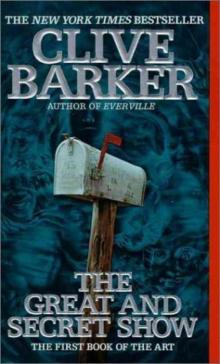 The Great and Secret Show
The Great and Secret Show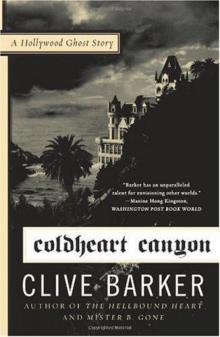 Coldheart Canyon: A Hollywood Ghost Story
Coldheart Canyon: A Hollywood Ghost Story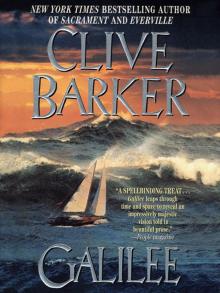 Galilee
Galilee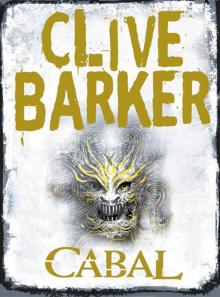 Cabal
Cabal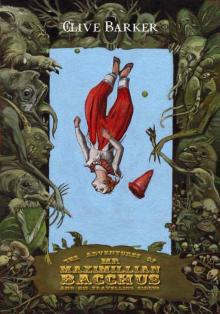 The Adventures of Mr. Maximillian Bacchus and His Travelling Circus
The Adventures of Mr. Maximillian Bacchus and His Travelling Circus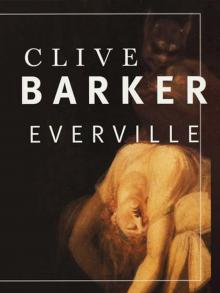 Everville
Everville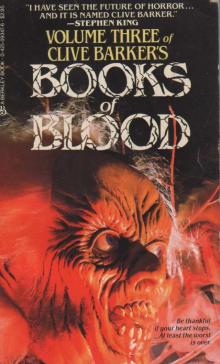 Books of Blood: Volume Three
Books of Blood: Volume Three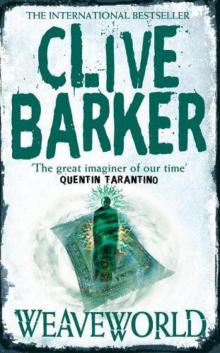 Weaveworld
Weaveworld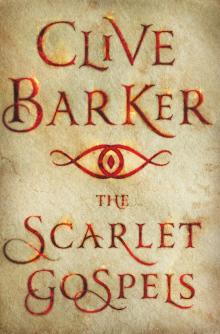 The Scarlet Gospels
The Scarlet Gospels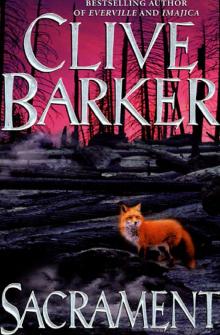 Sacrament
Sacrament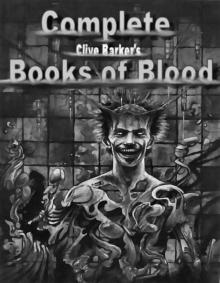 Books of Blood: Volumes 1-6
Books of Blood: Volumes 1-6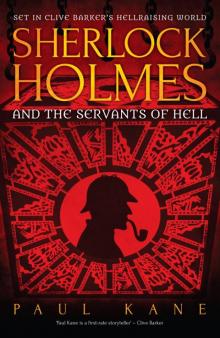 Sherlock Holmes and the Servants of Hell
Sherlock Holmes and the Servants of Hell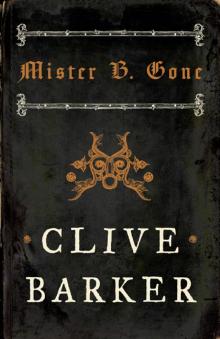 Mister B. Gone
Mister B. Gone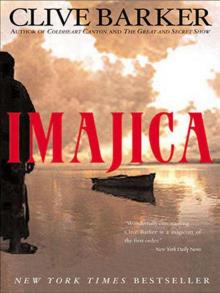 Imajica
Imajica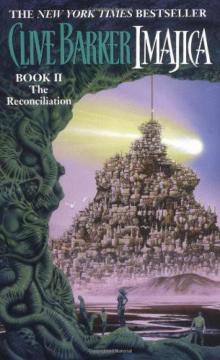 The Reconciliation
The Reconciliation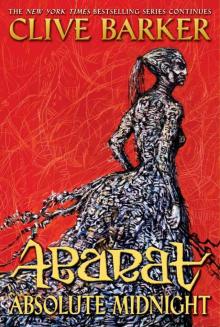 Abarat
Abarat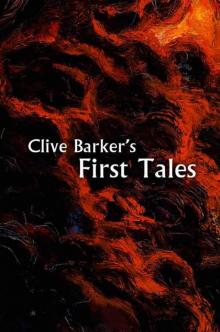 Clive Barker's First Tales
Clive Barker's First Tales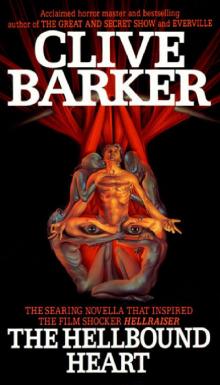 The Hellbound Heart
The Hellbound Heart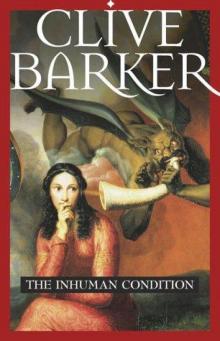 The Inhuman Condition
The Inhuman Condition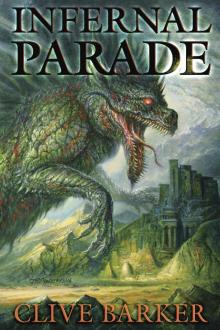 Infernal Parade
Infernal Parade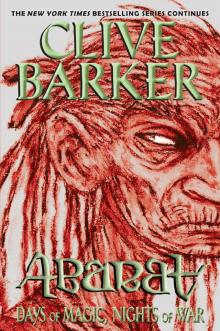 Days of Magic, Nights of War
Days of Magic, Nights of War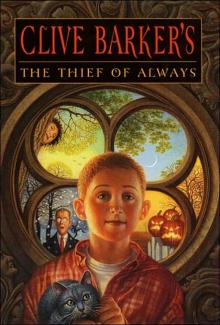 The Thief of Always
The Thief of Always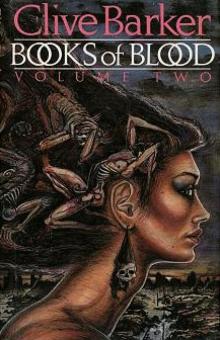 Books of Blood Vol 2
Books of Blood Vol 2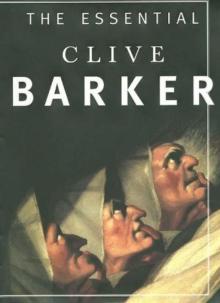 The Essential Clive Barker
The Essential Clive Barker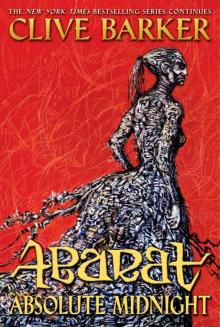 Abarat: Absolute Midnight a-3
Abarat: Absolute Midnight a-3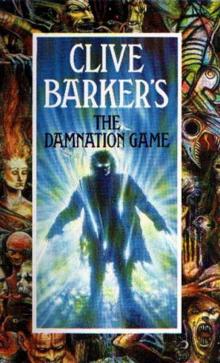 The Damnation Game
The Damnation Game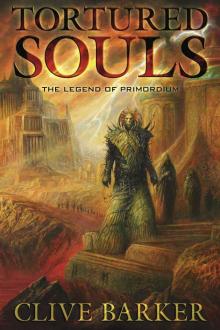 Tortured Souls: The Legend of Primordium
Tortured Souls: The Legend of Primordium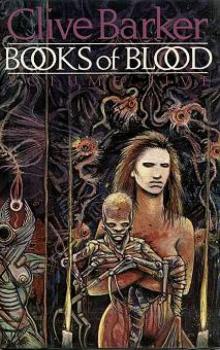 Books of Blood Vol 5
Books of Blood Vol 5 Imajica 02 - The Reconciliator
Imajica 02 - The Reconciliator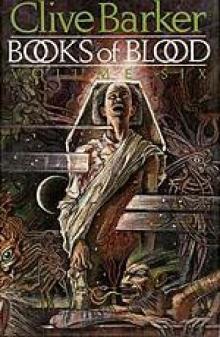 Books Of Blood Vol 6
Books Of Blood Vol 6 Imajica 01 - The Fifth Dominion
Imajica 01 - The Fifth Dominion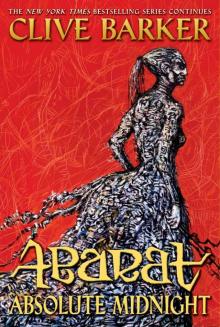 Abarat: Absolute Midnight
Abarat: Absolute Midnight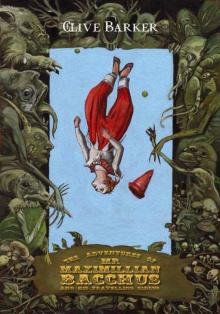 The Adventures of Mr. Maximillian Bacchus & His Traveling Circus
The Adventures of Mr. Maximillian Bacchus & His Traveling Circus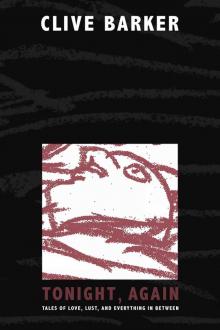 Tonight, Again
Tonight, Again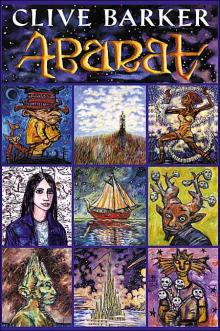 Abarat: The First Book of Hours a-1
Abarat: The First Book of Hours a-1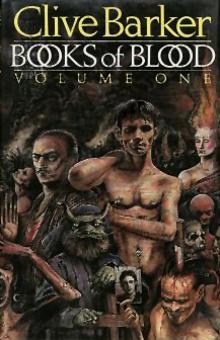 Books Of Blood Vol 1
Books Of Blood Vol 1 Age of Desire
Age of Desire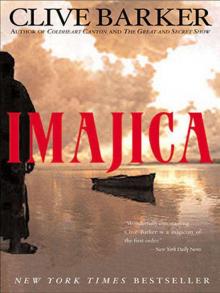 Imajica: Annotated Edition
Imajica: Annotated Edition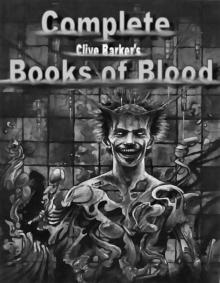 Complete Books of Blood
Complete Books of Blood Gutted: Beautiful Horror Stories
Gutted: Beautiful Horror Stories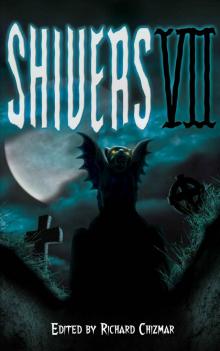 Shivers 7
Shivers 7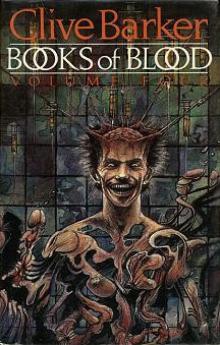 Books Of Blood Vol 4
Books Of Blood Vol 4